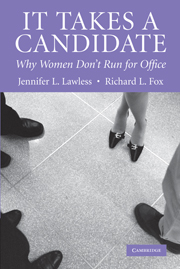Book contents
- Frontmatter
- Contents
- List of Tables
- List of Figures
- Acknowledgments
- 1 Electoral Politics: Still a Man's World?
- 2 Explaining Women's Emergence in the Political Arena
- 3 The Gender Gap in Political Ambition
- 4 Barefoot, Pregnant, and Holding a Law Degree: Family Dynamics and Running for Office
- 5 Gender, Party, and Political Recruitment
- 6 “I'm Just Not Qualified”: Gendered Self-Perceptions of Candidate Viability
- 7 Taking the Plunge: Deciding to Run for Office
- 8 Gender and the Future of Electoral Politics
- Appendix A The Citizen Political Ambition Study Sample Design and Data Collection
- Appendix B The Survey
- Appendix C The Interview Questionnaire
- Appendix D Variable Coding
- Works Cited
- Index
2 - Explaining Women's Emergence in the Political Arena
Published online by Cambridge University Press: 05 September 2012
- Frontmatter
- Contents
- List of Tables
- List of Figures
- Acknowledgments
- 1 Electoral Politics: Still a Man's World?
- 2 Explaining Women's Emergence in the Political Arena
- 3 The Gender Gap in Political Ambition
- 4 Barefoot, Pregnant, and Holding a Law Degree: Family Dynamics and Running for Office
- 5 Gender, Party, and Political Recruitment
- 6 “I'm Just Not Qualified”: Gendered Self-Perceptions of Candidate Viability
- 7 Taking the Plunge: Deciding to Run for Office
- 8 Gender and the Future of Electoral Politics
- Appendix A The Citizen Political Ambition Study Sample Design and Data Collection
- Appendix B The Survey
- Appendix C The Interview Questionnaire
- Appendix D Variable Coding
- Works Cited
- Index
Summary
On Sunday, December 7, 2003, U.S. Senator Hillary Rodham Clinton (D-NY) appeared on Meet the Press. After answering questions about Afghanistan, Iraq, and steel tariffs, the discussion turned to the 2004 Democratic presidential primary. Tim Russert, the host of the program, alerted Senator Clinton to the latest poll numbers, which indicated that she would be the overwhelming frontrunner for her party's nomination. Although Senator Clinton explained that she had no plans to run for president, Mr. Russert proceeded to ask her – eight different times – about the possibility of throwing her hat into the ring. Senator Clinton repeatedly stated that she had no interest in seeking the nomination, ultimately asserting: “I have said no and no and I'm trying to think of different ways of saying no and no.” But Mr. Russert spoke the last words when he asked, “How about 2008?”
At about the same time, another prominent woman decided not to run for office. Following months of lobbying by hopeful supporters, Michelle Nunn, the daughter of former U.S. Senator Sam Nunn, withdrew her name from consideration for an open U.S. Senate seat in Georgia. Ms. Nunn was an attractive potential candidate not only because she would have greatly benefited from her father's name recognition, but also because of her political experience: she is the founding director of Hands On Atlanta, one of the largest urban volunteer organizations in the country.
- Type
- Chapter
- Information
- It Takes a CandidateWhy Women Don't Run for Office, pp. 16 - 36Publisher: Cambridge University PressPrint publication year: 2005



